Food And Exercise
Eating well can improve your workout and recovery. Whether training for your first half-marathon, heading outside for a vigorous walk, or leaving for a day of skiing, what you eat before and after your outing will play a role in how well you achieve your fitness goals. For a workout to be successful, it must include adequate nourishment to help pump up your exercise and burn belly fat along the way.
Fuel up before you start. Carbohydrates provide energy for your workout and works even better by combining them with a small amount of lean protein. For the morning it could be a whole wheat bagel with peanut butter or low-fat granola with low-fat yogurt. If you prefer to exercise in the evening look at a lean protein such as chicken, a whole grain like brown rice for the carbohydrate energy, and a salad or vegetable. Be sure to stay away from fatty foods that are harder to digest like carbonated beverages, which also cause bloating.
Trial and error will help determine how soon you can exercise after eating. It really depends on the individual where some people can eat 10 minutes before going for a long jog without any stomach discomfort and others can’t eat anything within two hours of running.
Whether you should eat while you’re exercising depends on how long you work out and at what intensity. If you’re exercising for more than an hour be sure to replace your glycogen stores (sugar stored in the muscles for energy) every 60 to 90 minutes. Some good choices to consider are energy bars, dried fruit, gels (a supplement found in sports stores and grocery stores), crackers, and sports drinks are good choices.
Hydration is important too. It’s a good idea to consume 14 to 22 ounces of water about two to three hours prior to exercising, even if you’re not thirsty. During exercise, how much you drink will depend on the intensity and duration of your workout. Some consideration should be taken into account for what level of exercise your preforming at. With moderate exercise probably a drink to quench your thirst. With a more intense workout think about drinking 6 to 12 ounces every 15 minutes. For those long and hard workouts when your actually losing weight a good general rule is to drink 16 to 24 ounces of fluid for every pound lost.
Food for the finish. Once you’re done exercising you need to think about helping your body to recover. We are back to using carbohydrates to restore glycogen and protein helps repair and work towards building muscle. Healthy post-workout snacks include chocolate milk, yogurt, fruit with string cheese, lean meat, or an English muffin with peanut butter.
For those who are exercising with the goal of shedding a few pounds giving up carbs entirely is not the best way to go. Your body actually needs carbohydrates at some level or your body will not function especially if you are a avid exerciser or competitor.
Everyone’s nutritional needs is different depending on the duration, intensity, and type of activity. Also, under consideration here as well are personal factors, such as age, gender, height, and weight. But everyone “” from the moderate exerciser to the hard-core athlete “” will benefit from eating well. Eat to pump up your exercising and burn that belly fat with time.
Visit our website for access to all additional product reviews at Fitness-Secrets-Center.
The Fitness-Secrets-Center focuses on providing our visitors a wealth of information concerning little known fitness secrets that are available at our site. We’ve pulled together thirty three products for visitors review comprising the best of the best Fitness Secrets and most highly purchased Ebook products out on the internet today. Our goal with this site is to provide our visitors the opportunity to be better informed of what options are available to them as they look to better their






-SMALL.gif)
